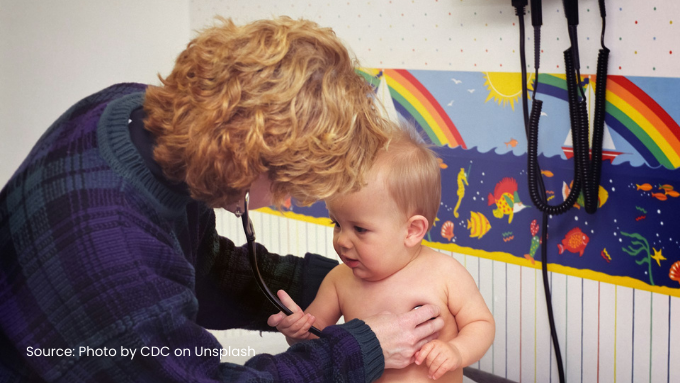Proses Asuhan Gizi Terstandar pada Pasien Pediatri Bronkopneumonia dan Kejang Demam Sederhana Pasca Konvulsi dengan Pemberian Diet Tinggi Kalori dan Tinggi Protein: Sebuah Laporan Kasus

Unduhan
Latar Belakang: Pasien pediatri dengan diagnosa bronkopneumonia dan Kejang Demam Sederhana (KDS) pasca konvulsi membutuhkan asuhan gizi khusus untuk mencegah kerusakan jaringan tubuh, pemulihan tubuh serta memenuhi asupan zat gizi. Selain itu, pasien dengan bronkopneumonia dan Kejang Demam Sederhana (KDS) pasca konvulsi terkadang juga mengalami penurunan nafsu makan dan konsumsi makanan yang kurang adekuat. Proses Asuhan Gizi Terstandar (PAGT) dengan pemberian diet Tinggi Kalori dan Tinggi Protein (TKTP) dilakukan guna memberikan makanan sesuai kebutuhan, sehingga membantu mempercepat proses penyembuhan serta meminimalisir terjadinya komplikasi penyakit.
Tujuan: Untuk mengetahui tata laksana proses asuhan gizi terstandar pada pasien pediatri bronkopneumonia dan Kejang Demam Sederhana (KDS) pasca konvulsi dengan pemberian diet tinggi kalori dan tinggi protein.
Metode: Studi kasus dilakukan pada bulan Januari 2023 pada pasien rawat inap di RSI Jemursari Surabaya. Sampel penelitian diperoleh dengan memilih pasien berdasarkan kriteria kasus besar meliputi rawat inap pasien >3 hari dan terdapat komplikasi penyakit pada pasien. Pengambilan sampel penelitian dilakukan dengan meninjau riwayat kesehatan pasien melalui rekam medis atas persetujuan perawat jaga dan didampingi oleh ahli gizi rumah sakit. Metode yang diterapkan pada pasien adalah dengan wawancara orang tua pasien untuk domain fisik, memantau rekam medis pasien pada domain biokimia, observasi selama 3 hari berturut-turut pada domain asupan yang dilihat dari 9 kali makan melalui food recall 24H dan visual comstock. Peneliti juga melakukan studi literatur guna melengkapi informasi yang diperlukan.
Hasil: Setelah dilakukan monitoring dan evaluasi yang dilakukan selama 3 hari didapatkan hasil bahwa suhu tubuh pasien berada pada rentang normal (tidak demam), berat badan pasien konstan/tetap, indikator biokimia tidak dapat dipantau peningkatan maupun penurunannya dikarenakan tidak terdapat hasil laboratorium pada hari berikutnya, dan pemenuhan asupan nutrisi pasien yang dilakukan selama 3 hari berturut-turut menunjukkan peningkatan hasil secara bertahap hingga >80%.
Kesimpulan: Pada kasus ini, pemulihan kondisi pasien cukup cepat. Terjadi peningkatan nafsu makan dan konsumsi makanan meningkat secara bertahap hingga >80%. Secara keseluruhan, intervensi gizi yang diberikan tercapai.
Ahmad et al. (2022) Modul Ajar Patofisiologi. Indramayu: Penerbit Adab.
Anggraini, D. and Hasni, D. (2022) ‘Kejang Demam', Scientific Journal, 1(4), pp. 325–331. Available at: https://doi.org/10.56260/sciena.v1i4.62.
Apriany, D. et al. (2022) Buku Ajar Anak DIII Keperawatan Jilid II. Jakarta: Mahakarya Citra Utama Group.
Aprina et al. (2022) Buku Ajar Anak S1 Keperawatan Jilid I. Jakarta: Mahakarya Citra Utama Group.
Arufina, M.. (2019) ‘Asuhan Keperawatan pada Pasien Anak dengan Bronkopneumonia dengan Fokus Ketidakefektifan Bersihan Jalan Nafas di RSUD Kabupaten Magelang', Jurnal Kesehatan Pena Medika, 8(2), pp. 66–72. Available at: https://doi.org/10.31941/pmjk.v8i2.727.
Black, J.M. et al. (2022) Keperawatan Medikal Bedah: Gangguan Sistem Pernapasan dan Oksigenasi. 9th Ed. Singapore: Elsevier Health Sciences.
Ferasinta et al. (2021) Konsep Dasar Keperawatan Anak. Pidie: Yayasan Penerbit Muhammad Zaini.
Hidayat, A.. (2012) Pengantar Ilmu Keperawatan Anak. Jakarta: Salemba Medika.
Kurniati, I. (2020) ‘Anemia Defisiensi Zat Besi (Fe)', Jurnal Kedokteran Universitas Lampung, 4(1), pp. 18–33. Available at: https://doi.org/https://doi.org/10.23960/jkunila4118-33.
Kusyani, A., Robiyah, A. and Nisa, D.K. (2022) Asuhan Keperawatan Anak dengan Kejang Demam dan Diare. Pekalongan: Penerbit NEM.
Lusia (2015) Mengenal Demam dan Perawatannya Pada Anak. Surabaya: Airlangga University Press.
Maryani, S. et al. (2023) Kejang Pada Neonatus. Padang: Global Eksekutif Teknologi.
Nasar, S.. et al. (2015) Penuntun Diet Anak. Ed. 3. Jakarta: Badan Penerbit Fakultas Kedokteran Universitas Indonesia.
Permenkes RI (2019) Peraturan Menteri Kesehatan Republik Indonesia Nomor 28 Tahun 2019 tentang Angka Kecukupan Gizi yang Dianjurkan untuk Masyarakat Indonesia. Indonesia.
Permenkes RI (2020) Peraturan Menteri Kesehatan Republik Indonesia Nomor 2 Tahun 2020 tentang Standar Antropometri Anak. Indonesia. Available at: http://hukor.kemkes.go.id/uploads/produk_hukum/PMK_No__2_Th_2020_ttg_Standar_Antropometri_Anak.pdf.
Prihanto, E.S.D. et al. (2022) Patologi Untuk Fisioterapi. Padang: Global Eksekutif Teknologi.
Putri, N.., Rahmah, H.. and Arbangi, S. (2023) ‘Proses Asuhan Gizi Terstandar Pada Pasien Bronchopulmonary Dysplasia Dengan Status Gizi Buruk', The Journal of Indonesian Community Nutrition, 12(1), pp. 72–84. Available at: https://doi.org/https://doi.org/10.30597/jgmi.v12i1.26041.
Samuel, A. (2014) ‘Bronkopneumonia on Pediatric Patient', J Agromed Unila, 1(2), pp. 185–189. Available at: https://juke.kedokteran.unila.ac.id/index.php/agro/article/view/1327/pdf.
Suartawan, I.. (2019) ‘Bronkopneumonia Pada Anak Usia 20 Bulan', Jurnal Kedokteran, 05(01), pp. 198–206. Available at: https://doi.org/http://dx.doi.org/10.36679/kedokteran.v5i1.177.
Sulastien, H., Sudariani, W, P. and Prasetya, Y. (2022) Buku Ajar Keperawatan Gawat Darurat Dilengkapi dengan Diagnosa SDKI, SIKI SLKI dan Manajemen Disaster. Bogor: GUEPEDIA.
Wahyuni, E., Neherta, M. and Sari, I.. (2023) Kolaborasi Keluarga dan Perawat (Perawatan Anak Dengan Pneumonia). Indramayu: Penerbit Adab.
Yogarajah, M. et al. (2017) Crash Course Neurologi. 1st Ed. Singapore: Elsevier Health Sciences.
Yunike et al. (2023) Asuhan Keperawatan Anak. Padang: Global Eksekutif Teknologi.
Hak Cipta (c) 2024 Fera Feheliani Cristanti, Trias Mahmudiono, Erfiana

Artikel ini berlisensiCreative Commons Attribution-ShareAlike 4.0 International License.
Media Gizi Kesmas by Unair is licensed under a Creative Commons Attribution-ShareAlike 4.0 International License.
1. The journal allows the author(s) to hold the copyright and to retain the publishing right of the article without restrictions.
2. The legal formal aspect of journal publication accessibility refers to Creative Commons Attribution-Share-Alike (CC BY-SA).
3. The Creative Commons Attribution-Share-Alike (CC BY-SA) license allows re-distribution and re-use of a licensed work on the conditions that the creator is appropriately credited and that any derivative work is made available under "the same, similar or a compatible license”. Other than the conditions mentioned above, the editorial board is not responsible for copyright violations.



















